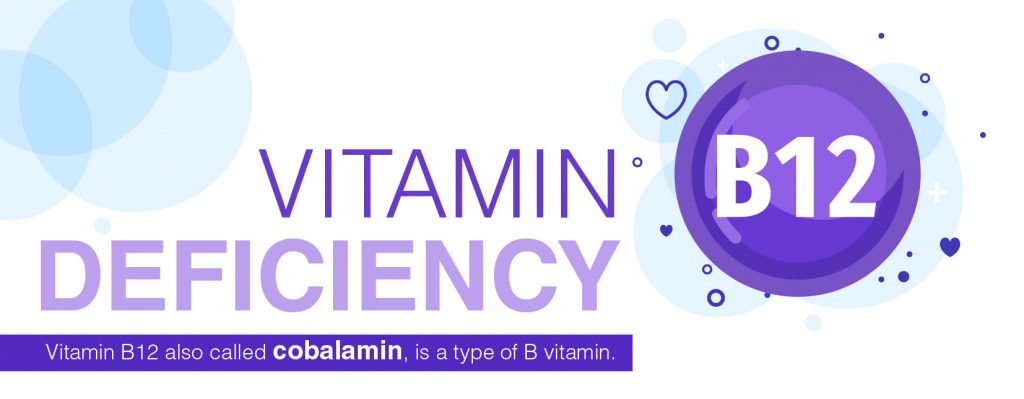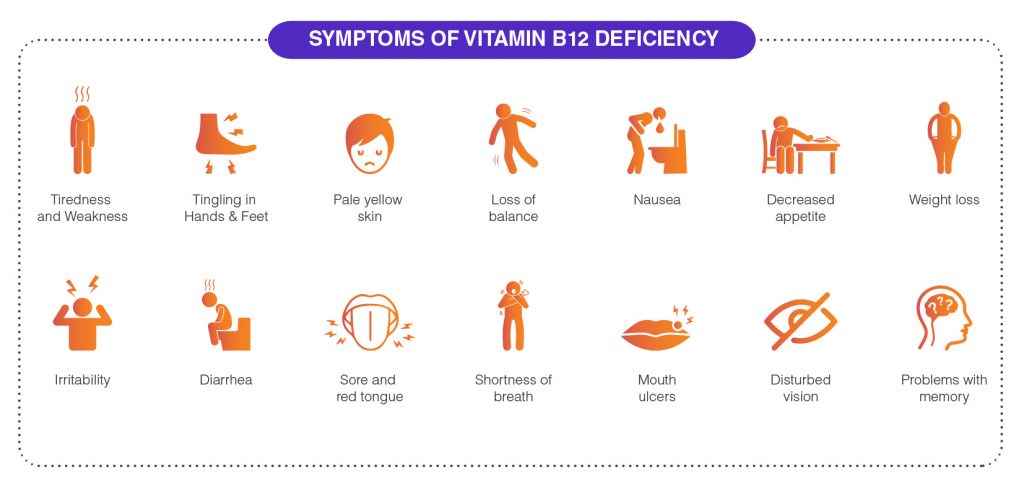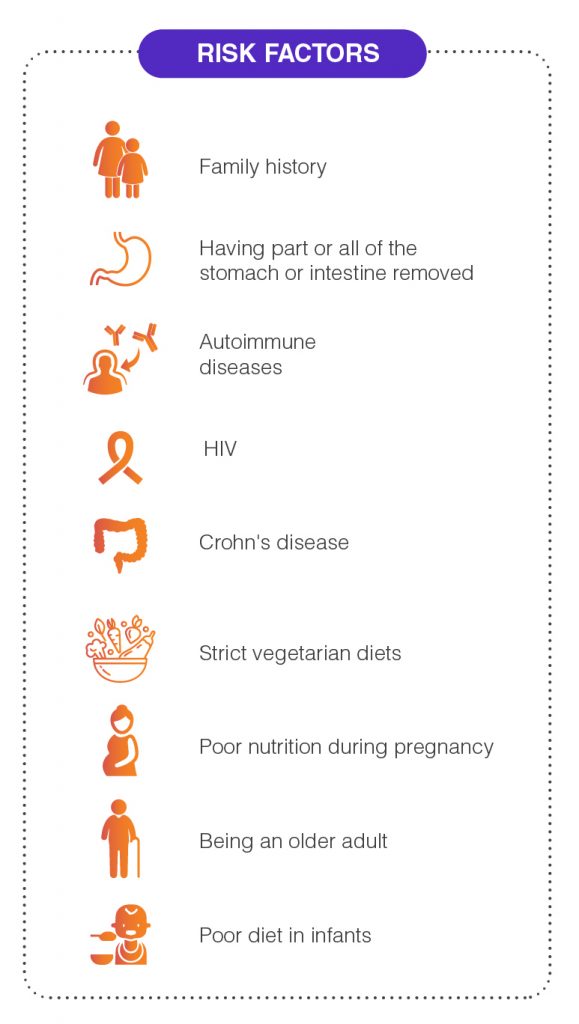Overview of Vitamin B12 Deficiency
Overview
Vitamin B12 also called cobalamin, is a type of B vitamin. It’s a water-soluble vitamin which means it can dissolve in water and travel through the bloodstream. The human body can store vitamin B-12 for up to four years and any excess vitamin B-12 is excreted in the urine. Vitamin B12 deficiency occurs when there are inadequate levels of vitamin B12 in the body. Vitamin B12 is essential for:

- Red blood cell production, which carries oxygen to all parts of the body.
- DNA synthesis
- A healthy nervous system
Vitamin B12 is also important for a healthy heart and is critical during pregnancy for a baby’s developing brain and nervous system.
What are the symptoms of Vitamin B12 deficiency?
Vitamin B12 performs several important functions in the body, including keeping the nervous system healthy. A deficiency can cause a wide range of problems, including:

- Tiredness and Weakness, one of the most common symptoms of Vitamin B12 deficiency.
- Numb or tingling feeling in hands and feet
- Pale yellow skin color, lack of red blood cells makes the skin look colorless.
- Loss of balance
- Nausea
- Decreased appetite
- Weight loss
- Irritability
- Diarrhea
- Sore and red tongue
- Shortness of breath, due to poor formation of red blood cells.
- Mouth ulcers
- Disturbed vision, as Vitamin B12 deficiency affects the nervous system it often damages the optic nerve leading to poor vision.
- Problems with memory, understanding, and judgement. Vitamin B12 deficiency can lead to severe mood swings and even depression. Other problems like thinking or reasoning problems and memory loss can also occur.
What causes Vitamin B12 deficiency?
Vitamin B12 deficiency anemia may be caused by one of the following:

- Pernicious Anemia: A protein called intrinsic factor is required for vitamin B12 absorption by the body. This protein is produced by cells in the stomach lining. In people with pernicious anemia, the body’s immune system mistakenly attacks these cells, preventing intrinsic factor from combining with vitamin B12 and hampering its absorption. This condition most commonly affects people over 50 years old.
- Stomach conditions such as Atrophic gastritis, which causes thinning of the stomach lining can cause vitamin B12 deficiency.
- Intestinal conditions such as Crohn’s disease, a condition that causes inflammation of the lining of the digestive tract may lead to vitamin B12 deficiency.
- Surgical procedures that remove part or all of the stomach, or the end of the small intestine, may prevent adequate absorption of vitamin B12.
- Certain medications can interfere with the absorption of Vitamin B12.
- Strict vegans and people with a poor diet are at a higher risk of developing Vitamin B12 deficiency.
What are the Risk Factors for Vitamin B12 deficiency?
The risk factors for vitamin B12 deficiency anemia include:

- A family history of the disease
- Having part or all of the stomach or intestine removed
- Autoimmune diseases, including type 1 diabetes
- Crohn’s disease
- HIV
- Strict vegetarian diets
- Being an older adult
- Poor diet in infants
- Poor nutrition during pregnancy
How is Vitamin B12 deficiency diagnosed?
The doctor may suspect Vitamin B12 deficiency based on medical history and symptoms. Following laboratory tests may be ordered to confirm the diagnosis:

- Standard blood tests to measure the level of red blood cells and their appearance. In Vitamin B12 deficiency, red blood cells are unusually large and appear abnormal.
- Blood tests to measure levels of iron and folate to check for deficiencies.
- Blood test to measure methylmalonic acid level. The blood level of methylmalonic acid increases when a person has Vitamin B12 deficiency.
- Blood tests for intrinsic factor antibodies. Most people who lack intrinsic factor in their stomach have these antibodies in their blood.
How is Vitamin B12 deficiency treated?
Vitamin B12 deficiency anemia is treated with supplements of vitamin B12 and intake of foods that are rich in vitamin B12 such as:

- Eggs
- Meat
- Poultry
- Milk
- Shellfish
- Fortified cereals
What are the complications of vitamin B12 deficiency?
Vitamin B12 deficiency can cause complications depending on the severity and duration of the deficiency:

- Megaloblastic anemia: It is characterized by red blood cells that are larger than normal. As the red blood cells are too large, they may not be able to exit the bone marrow to enter the bloodstream and deliver oxygen.
- Neurological problems: These may include vision disturbances, memory loss, difficulty walking or speaking, and damage to the nerves (peripheral neuropathy), particularly in the legs.
- Infertility: Vitamin B12 deficiency may cause women to be unable to fall pregnant.
- Stomach cancer: The risk of developing stomach cancer may be increased in the case of vitamin B12 deficiency
- Neural tube defects: Pregnant women with vitamin B12 deficiency may be at an increased risk of their baby developing serious birth defects.













